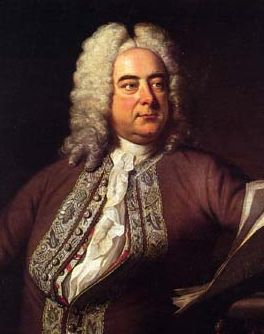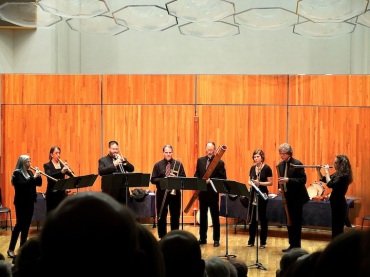The Well-Tempered Ear
Classical music: Think not “early music,” but “early musics.” The 14th annual Madison Early Music Festival opens with the Renaissance band Piffaro taking listeners centuries back in the past to discover the roots of later music and even today’s music. Plus, the festival’s FREE Handel Aria Competition is tonight at 7 p.m. in Mills Hall.
2 Comments
REMINDER: Tonight at 7 p.m. in Mills Hall is the first annual FREE Handel Aria Competition of the Madison Early Music Festival. In a contest sponsored by local business owners and arts patrons Dean and Orange Schroeder, of Orange Tree Imports in Monroe Street, eight finalists out of 48 entrants from the U.S. and Canada will compete for cash prizes from a jury and audience approval. It is a terrific opportunity to be exposed not only to the great vocal music of George Frideric Handel (below) but also to the Madison Early Music Festival.
For background, here are links to a July 4 story by Lindsay Christians in 77 Square, to my own previous blog post and to the official Handel aria site:
http://www.handelariacompetition.com/Handel_Aria_Competition/Handel_Aria_Competition_Finalists.html
By Jacob Stockinger
The secret of any music — or any work of art, old or now, for that matter — is to appreciate it for itself.
And the Renaissance band Piffaro (below) offered plenty of chances to do that during its rousing performances that opened up the 14th annual Madison Early Music Festival on Saturday night in Mills Hall on the UW-Madison campus.
A thoughtfully constructed and generous program — I counted 17 different composers — of serious or art music mixed with scared music and popular or vernacular music from the 11th through the 17th centuries proved a perfect curtain-raiser for this year’s theme of “The German Renaissance” that led form the late Medieval to the early Baroque.
True, as UW-Madison professor emeritus of Medieval history John W. Barker pointed out during his accessible and informative pre-concert lecture (below), Germany wasn’t really unified until 1871. For centuries from the Middle Ages on, it had remained a conglomeration of fiefdoms, dukedoms and city states. Yet clearly a shared cultural sensibility, influenced by music coming from France and Italy, had started to emerge much earlier.
Still, to modern ears, what struck one were the similarities more than the differences between music then and music now.
So at the beginning of a program, a bright and upbeat fanfare (below, during the performance in Mills Hall) by Ludwig Senfl (c. 1486-1543) reminded one nearby listener of Philip Glass. Indeed, she was right. The insistent repetition and strong beats brought to mind such contemporary Minimalists as Glass, John Adams and Steve Reich.
What’s that old French saying? “Plus ca change, plus c’est la meme chose, or The more things change, the more they stay the same.”
Later on, a section of the thematic program devoted to chromaticism also took one back to more well-known music. Of course, chromaticism had always been a part of Western European music; indeed, chromaticism is inherent in the whole concept of a scale as you go up or down the scale step by step.
But there The Ear was, listening to much older names such Orlando de Lassus and Jacob Handl, and thinking of Liszt and Wagner and late 19th-century Romanticism as he listened to chromatic music from the 16th and 17th centuries.
And then of course came the revelations about time and evolution. Another section of the program, with outstanding guest soprano Ellen Hargis (below) featured a famous hymn tune “Christ ist erstanden” (“Christ is risen”) over 700 years.
That’s some impressive interval when you think about it. It is twice the amount of time that has elapsed from the birth of J.S. Bach to now – and those 700 years only got the listeners up to – who else? — J.S. Bach, or what many listeners today mistakenly feel is the beginning of Western classical music.
Of course, there was much more to appreciate. There were the eight instrumentalists plus the outstanding guest soprano.
And it was nothing short of amazing to see and hear how many different instruments and contrasting styles of music each member of Piffaro proved adept at. It all proved one big lesson: There really is no single “early music.” Just as there was no such thing as Renaissance Germany, but instead, as Barker insisted, many “Germanies,” so too there was no early music, but instead a lot of “early musics.” Learning to appreciate the pluralism of the past, despite what seems our instinctive intellectual tendency towards singularity and exclusion, is a major achievement.
Also, the instruments themselves seemed a kind of artistic genre, with individual instruments (below) looking like works of art with their gleaming wood and brass, their handsome leather and graceful shapes. At intermission, the members of the band thoughtfully left their instruments on stage for the audience to look at. To The Ear, they proved fascinating, above and beyond their usefulness, as sheer beautiful art objects that ranged from harps, lutes and bagpipes to shawms (early oboes). recorders (early flutes) and sackbuts (early trombones).
But more of that in another post.
For now, let’s just say that it is hard to imagine a better way to open this particular festival or any early music festival – and early music is by now a big industry, as the many ads for other such festivals in the program made abundantly clear – than with a reminder of just how much continuity links the past and the present.
For more information about the remaining events in the Madison Early Music Festival, which runs through Friday, visit: http://continuingstudies.wisc.edu/lsa/memf/






